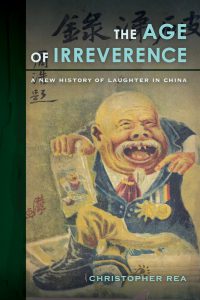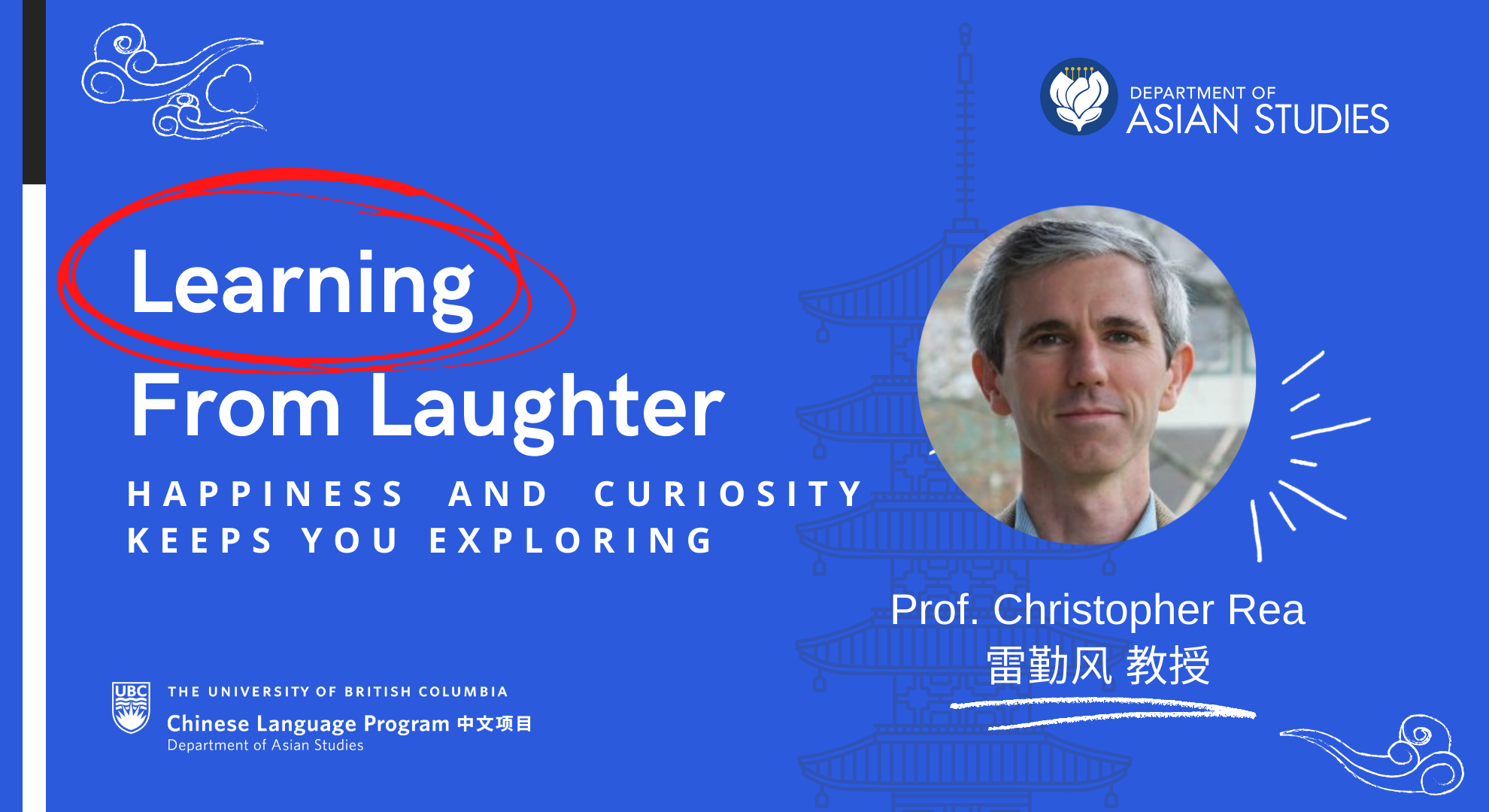

Learning a language is a source of excitement and immense fun. The decision to take Chinese classes is often simple, although navigating the complex web of language and literature learning is certainly not so. How does one keep motivated? How can Chinese serve my future? What can one do when faced with adversity in language learning? Dr. Christopher Rea 雷勤风教授, Professor of Modern Chinese Literature at UBC, humorously shared his experience with language learning, with over 100 participants joining in on the laughter of relatable experiences, as well as aspirations for their own future.
Learning can be challenging, and is often thought to be separate from fun, however, Dr. Rea’s personal experience with language learning is that we should learn through what we find enjoyable but meaningful. Dr. Rea mentioned that it was only after he began learning Chinese that interest turned into a passion, leading him to studying and working in China. A literary and cultural historian, his research interests first stemmed from things he found interesting, such as “Did China have an equivalent of Monty Python’s Flying Circus ?”. This is what later led him to spend several years researching The Age of Irreverence: A New History of Laughter in China, and several more years watching and reading about old black-and-white films for his most recent book and online course, Chinese Film Classics, 1922-1949.
Many of the participants were surprised by Dr. Rea’s advanced Mandarin skills, saying that it was inspiring and motivating to hear his learning journey. One of the learning strategies Dr. Rea brought up was to learn through what makes you HAPPY. If it is music that interests you, utilize Chinese songs as a learning method, and for those that may enjoy reading, exploring the vast world of Chinese literature is quite conducive to language learning. As our attendees had diverse language backgrounds, many people have experienced the challenges of pronunciation. Dr. Rea gave an interesting and helpful tip, saying that your accent is not as important as the way you speak, and through mimicking the diction of locals, you can speak a language like a local.
Learning a new language should bring one joy. If we employ what makes us laugh as our learning methods, enrich our learning journey with meaningful experiences, it is not difficult to maintain motivation.
“I was very inspired by Dr. Rea’s discussion about his own Chinese learning journey as a non-native Chinese speaker like myself. I’m at the very beginning of this Chinese learning journey, but he still mentioned multiple learning strategies that I could apply to my own learning. I was fascinated by the way he completely integrated himself into education programs throughout China that did not allow English, forcing himself to learn Chinese based on a sense of survival. I am inspired by this to step out of my own comfort zone with Chinese learning and “faking it until I make it” as Dr. Rea mentioned, by practicing using the language in the real world while ordering bubble tea or ordering at a Chinese restaurant.”
— Agnew, Sarah (安善恩), CHIN 131 Student
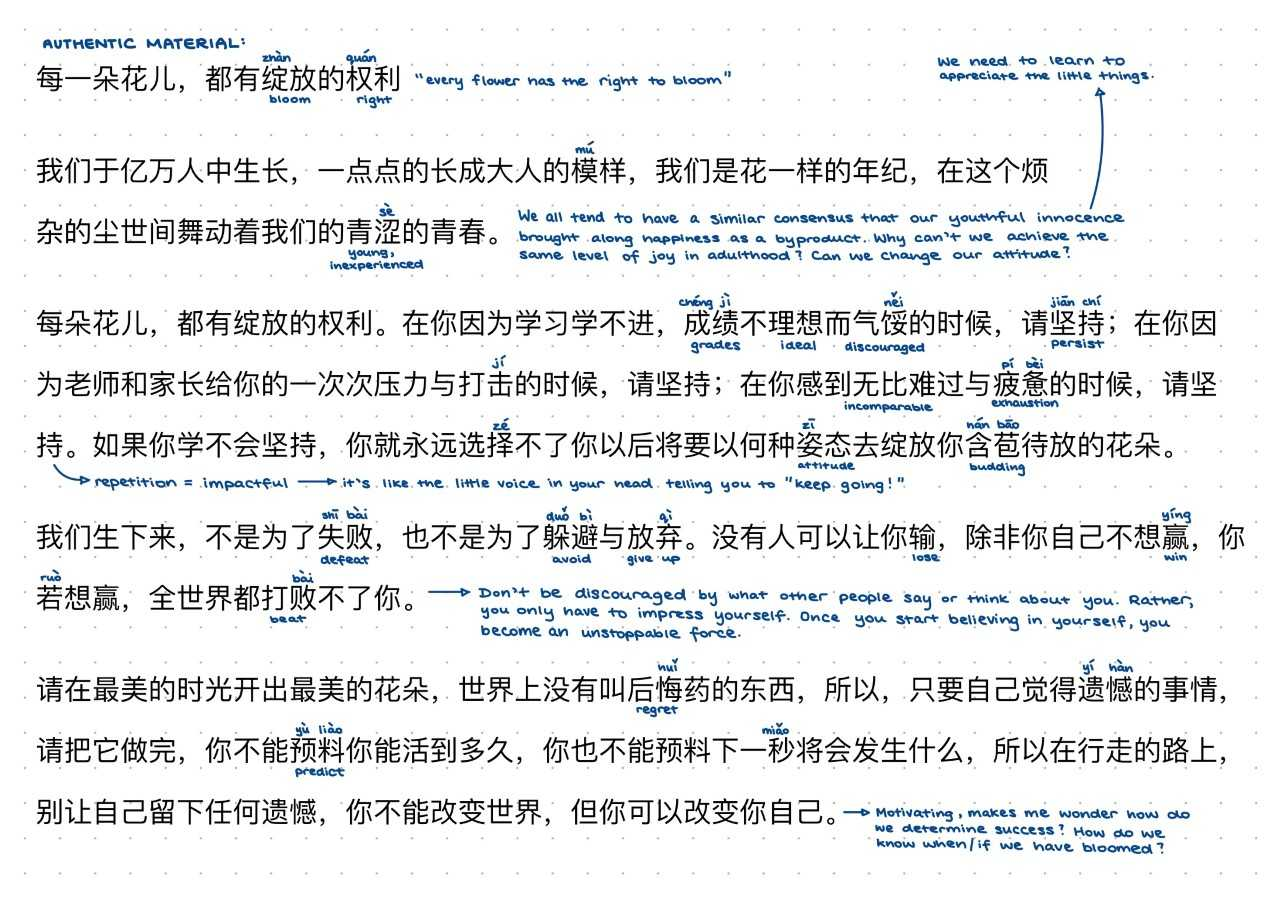

CHIN 243 student Jenny Chen shares one of the ways she studies for Chinese.
“作为一个大一学生,我正在考虑我要选择什么专业。但他鼓励我慢慢来,花点时间找到我的激情和爱好。另外,如果我想学好中文,我需要沉浸在中文环境中,例如,读中文书,多跟说母语的人聊天,以及看中文电影和电视剧。学习的时候不要害怕在社会中 使用我刚学到的新知识。努力走出你的舒适区,去挑战自己。”
(As a freshman, I was considering what major I would choose. But [Professor Rea] encouraged me to take my time and take some time to find my passion and hobbies. In addition, if I want to learn Chinese well, I need to be immersed in the Chinese environment. For example, reading Chinese books, chatting with native speakers, and watching Chinese movies and TV shows. When studying, don’t be afraid to use the new knowledge I just learned in society. Try to get out of your comfort zone and challenge yourself.)
— Jenny Chen (陈奕芊), CHIN 243 Student
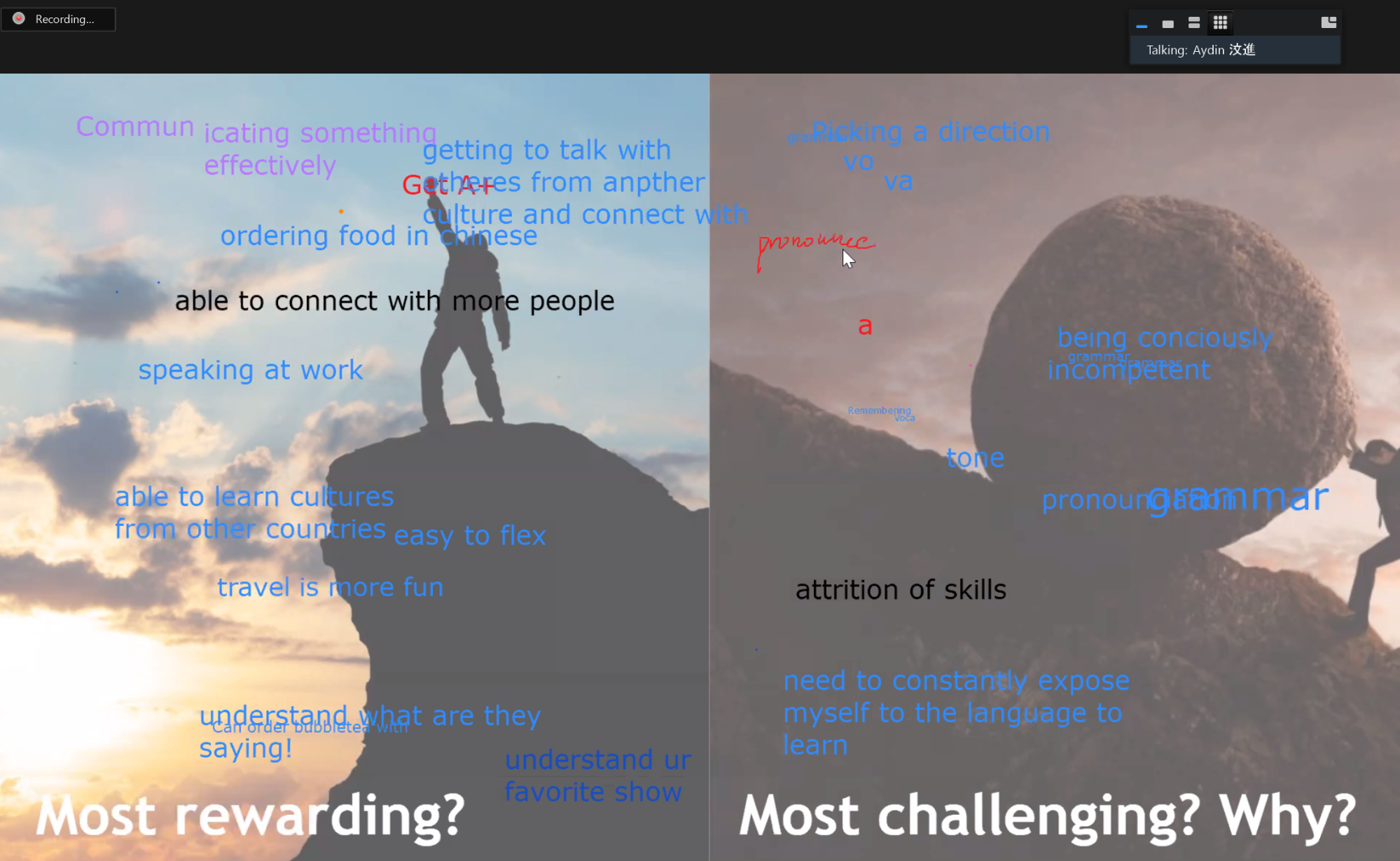

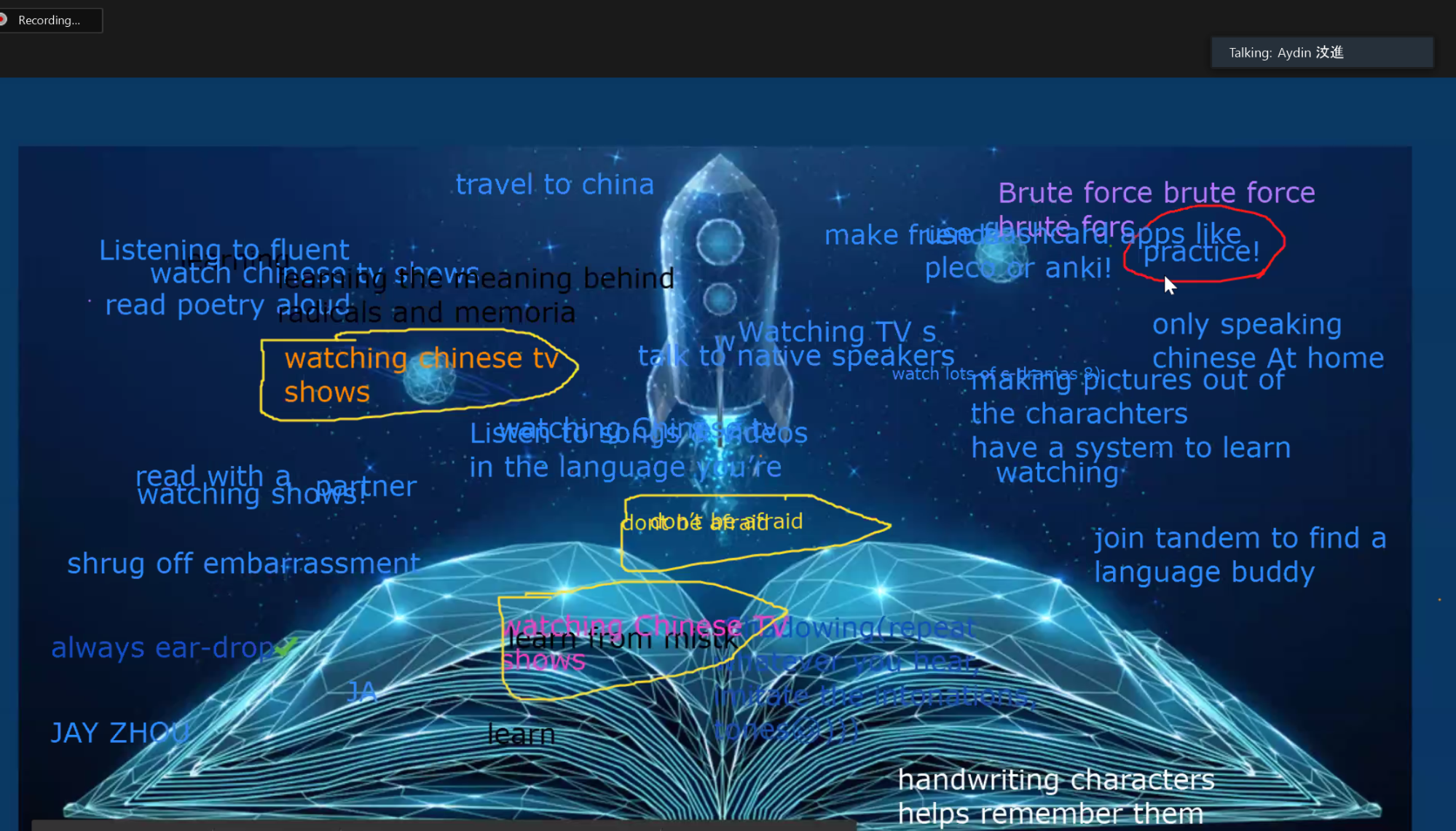

Brainstorming as a group, students discussed what made learning Chinese
so interesting and came up with some simple action plans to help each other improve Chinese.
“Professor Rea made a number of very interesting suggestions about how to stay engaged while learning a language in his presentation. One point in particular really stood out to me and that was switching from “learning” language to “living” language. What he meant by this was that there are two broad categories in learning a language: (1) “learning”: studying and learning vocabulary, grammar, and pronunciation through textbooks, audios, etc., (2) “living”: practice just going out into the real world and using that language as best you can, whether that be communicating through text messages with friends in Chinese, sending voice messages, or just chatting with friends in Chinese.”
— Kaitlyn Mak (麦晴), CHIN 233 Student
“I liked Professor Rea’s points about how history is made by the people who show up. I like that idea because it reminds me of the importance of participation not only in Chinese classes, but also in Chinese cultural events and how I can continue to network and speak with other people who share my interest in Chinese culture and Chinese language to help me improve my language learning, but also learn about different aspects of Chinese culture from other people.”
— Caitlyn Goss (高琳), CHIN 407 Student”
One important question brought up in this talk was in regards to pursuing literature—why would students who are not majoring in Asian Studies or Chinese language and culture choose to study Chinese literature? Language learning is usually seen through the lens of usability, however Dr. Rea expressed that through the process of learning literature, you will discover more and more advantages to studying Mandarin, so it is worth setting aside considerations for usability if literature is something of interest to you, something that brings you joy and possibly a feeling of humour.
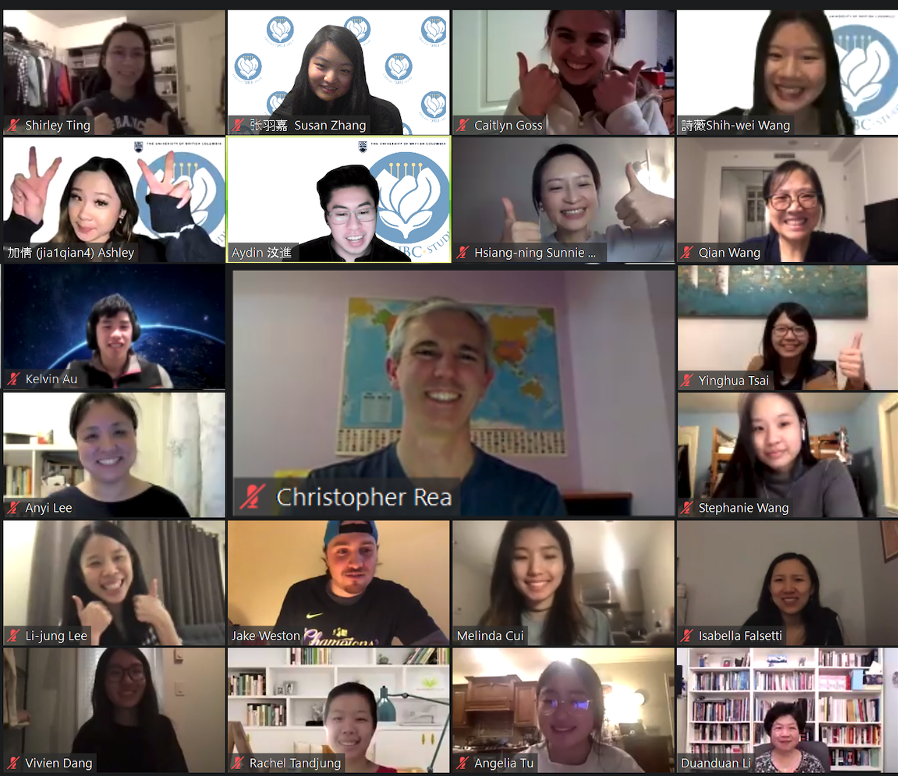

A wonderful night of laughter and knowledge sharing!
“[The language talk] not only gave an astonishing summary of my experience for language learning so far but also gave me vignettes of strategies that simplify the many years of experience which Dr. Christopher Rea had practiced himself. One of the very useful strategies that outshined the others in my personal opinion included the use of media in Chinese culture, whether that be in music, film, or text, and to slowly build an understanding through these sources.”
— Eric Leung(梁轩霖), CHIN 343 Student
“其中当我听到Aydin同学提问如何始终保持对学习中文的积极性,我觉得雷勤风教授的回答让我印象深刻。在我学习英语的时候,也会有很多时候觉得枯燥,就跟雷勤风教授说的特别是当我要静下心来学很长一段时间的时候。但是我发现如果是换一种方式,比如读一本英文小说、看一部英文电影,或者是在Youtube上看一些视频都可以让学习英语的过程变得更有意思,这就像雷勤风教授会看豆瓣一样,我觉得这是一种非常好的学习一个新语言的活动。”
(When I heard moderator Aydin’s question about how to keep learning Chinese, I felt that Professor Lei Qinfeng’s answer impressed me deeply. When I study English, I feel bored sometimes, as Professor Rea said when he started studying Chinese. But I found that if it is a different strategy, such as reading an English novel, watching an English movie, or watching some videos on youtube, the process of learning English can become more interesting, just like Professor Rea would watch Douban, I think it is a very good activity to learn a new language.)
— Jiamei Han (韩佳美), CHIN 473 Student
“那天雷老师所讲的有一点我十分有感触,就是学习语言和文化的时候不应该带有很强的目的性或考虑学习的实用性。 如果在学习之前就把自己局限在一个框架,清楚地设定好学习的方向,而忽略了可能接触到的更有意思的东西,那么学习本身将会带有功利性并且失 去了它本身的趣味 。在我们接触一种语言和文化时,应该顺其自然地去发现自己感兴趣的东西,再深挖和探究。这才是我们学习语言的最大动力。”
(One thing that Professor Rea said that day I am very impressed with is when learning language and culture, you should not go into it just thinking only about the practicality of learning. If you limit yourself to a practicality framework before learning, the direction of learning will ignore the more interesting things you may encounter, and you will lose interest. When we come into contact with a language and culture, we should go with the flow to discover what we are interested in, and then dig and explore. This is the biggest motivation for us to learn languages.)
— Melinda Cui (崔欢) — CHIN 493 Student
Dr. Rea shared one quote that really resonated with attendees: “History is made by the people who show up.” To better navigate one’s learning journey, take the opportunities you are given , and focus on what makes you laugh. Know that your learning journey need not be linear, follow wherever your curiosity guides you to, and pursue what brings you joy. As Dr. Rea said, you will discover more and more advantages to learning Mandarin as you go through the process, so approach your learning journey with an open mind, and chase what sparks laughter!
Acknowledgement: We would also like to extend a heartfelt thank you to the Chinese Language instructors that joined along in the laughter and conversation that evening to engage in this activity with their students: Anyi Lee, Lijung Lee, Duanduan Li, Pihua Lin, Mingzhu Lu, Yinghua Tsai, Hsiang-ning Wang, Qian Wang, Xinxin Wu, Xiaowen Xu (in alphabetical order).

